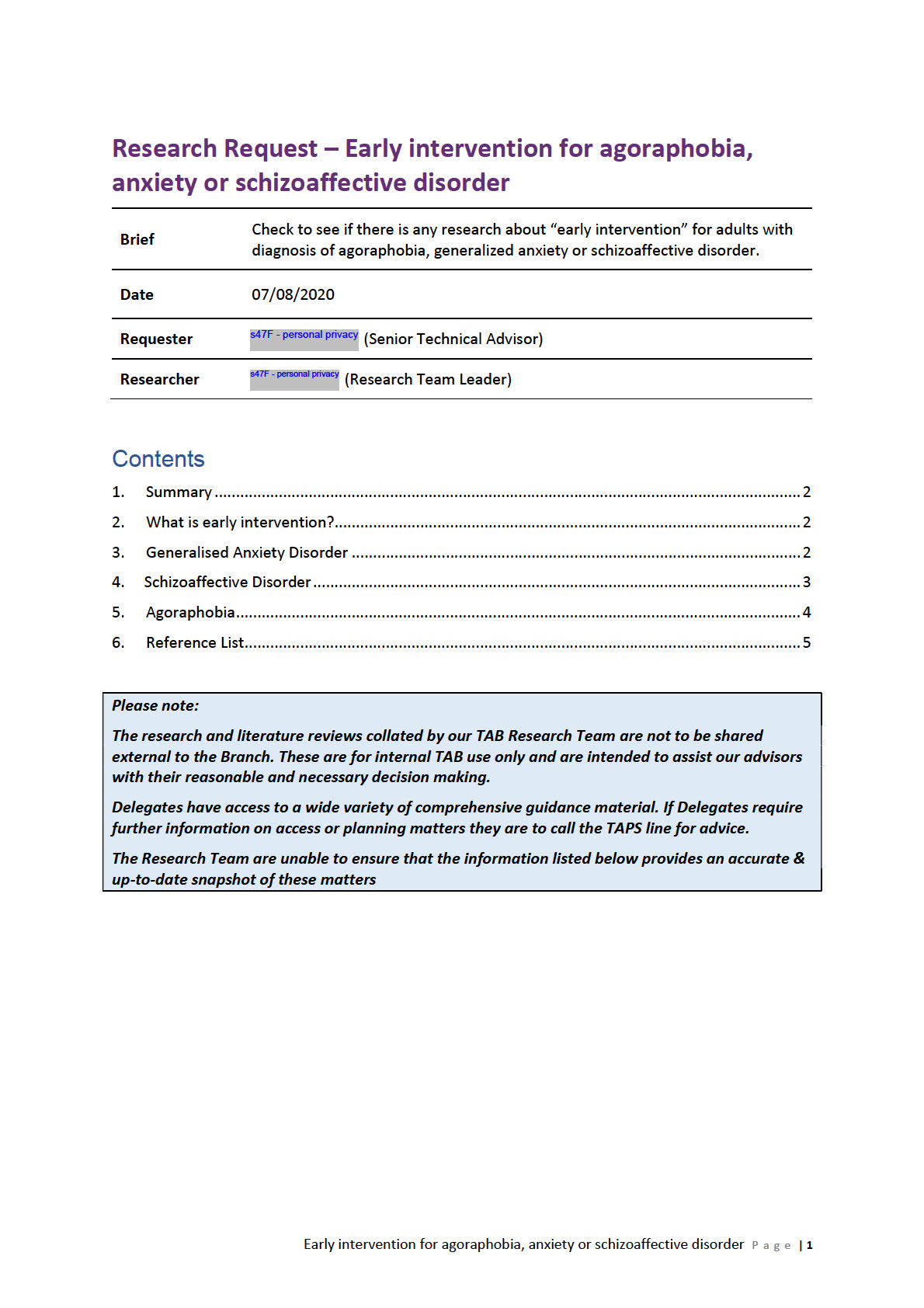
FOI 24/25-0151
FOI 24/25-0151
1. Summary
Early intervention should be delivered to individuals at risk of developing a disorder
or showing early or mild signs of the problem
Various interventions have been explored for anxiety and schizophrenia, however,
there is little on agoraphobia
Papers rarely provided an sort of timeline for when these intervention should be
delivered, other than to say it should be ‘early’ or when symptoms were mild to
moderate
o One paper on schizophrenia noted it should occur within 3 years of psychotic
illness
2. What is early intervention?
Early intervention is the process of providing specialist intervention and support to a person
who is experiencing or demonstrating any of the early symptoms of mental illness.
Intervention is not only critical for preventing or reducing the progress of a mental illness,
but for improving a person’s mental and physical health, community participation and
socioeconomic outcomes far into the future.
3. Generalised Anxiety Disorder
1. In relation to anxiety, early intervention programs are distinguished from prevention
programs, as early intervention programs target individuals at risk of developing a
disorder or showing early or mild signs of the problem. On the other hand,
prevention programs in the true sense do not require that an individual is either at
risk or showing any signs of a disorder [1].
Aims of early intervention for anxiety [1]:
1. Increase resilience
2. Social confidence
3. Regulation of emotion
4. Ability to anticipate and solve problems
No mention of precise time frame for when delivery of early intervention should occur (e.g.
within a year of symptoms developing) [1].
2. The Beyond Blue Foundation [2] performed an evidence review of prevention and
early intervention strategies for depression and anxiety. This included adults with
mild to moderate disease. As symptoms can emerge across the lifespan, it is
suggested that opportunities to prevent and manage occur early on in the diagnosis.
Early intervention for agoraphobia, anxiety or schizoaffective disorder P a g e | 2
FOI 24/25-0151
What early intervention and prevention policies, programs, or services are effective at
managing anxiety in adults?
It is highly recommended that internet- and mobile app-delivered interventions be
implemented for people experiencing mild–moderate anxiety [2].
There is some evidence that unguided interventions are effective for anxiety, but
more research needs to explore the role of therapist support in this context [2].
As with depression, it is recommended that these interventions be implemented
among non-treatment-seeking populations, or those who are otherwise unable to
engage with usual, high-quality care in order to maximise the impact of these
interventions on anxiety symptoms [2].
Exercise-based interventions are also recommended for young people wanting to
reduce worry [2].
4. Schizoaffective Disorder
A Cochrane Review has evaluated the effects of early intervention strategies for
schizophrenia [3].
In broad terms, early intervention has two objectives: the first is to prevent the onset of
schizophrenia in people with prodromal symptoms (mood changes such as anxiety,
depression, mood swings, sleep disturbances, irritability, anger, and suicidal ideas); the
second is to provide effective treatment to people in the early stages of schizophrenia
(including first episode of psychosis), with the goal of reducing the ultimate severity of the
illness [3].
The 18 included studies produced emerging, but inconclusive evidence that people in the
prodromal phase of psychosis can be helped by some interventions. There is some support
for specialised early intervention services, but further trials would be desirable, and there is
a question of whether gains are maintained. There is some support for phase-specific
treatment focused on employment and family therapy, but again, this needs replicating with
larger and longer trials [3].
Older literature has suggested that early intervention and early diagnosis teams are
expected to meet needs of people for the first time during the first 3 years of psychotic
illness (usually within the ages of 14-35 years) [4].
Early intervention for agoraphobia, anxiety or schizoaffective disorder P a g e | 3
FOI 24/25-0151
5. Agoraphobia
Unable to find any early intervention strategies which focus solely on agoraphobia.
One study looked at panic disorder with secondary symptoms of agoraphobia [5]. The early
intervention course developed specifically for adults and was based on cognitive-
behavioural principles and makes use of interventions that have appeared effective in the
treatment of the full-blown panic disorder.
Participants labelled as ‘early’ were those presenting with subthreshold or mild panic
disorder, defined as having symptoms of PD falling below the cut-off of 13 on the Panic
Disorder Severity Scale-Self Report (PDSS-SR). No mention of time since diagnosis/symptom
onset [5].
Early intervention for agoraphobia, anxiety or schizoaffective disorder P a g e | 4
FOI 24/25-0151
6. Reference List
1. Dadds M, Seinen A, Roth J, Harnett P. Early Intervention for Anxiety Disorders in
Children and Adolescents. Clinical Approaches to Early Intervention in Child and
Adolescent Mental Health, Volume 2. Australian Early Intervention Network for
Mental Health in Young People, c/o CAMHS Southern, Flinders Medical Center,
Bedford Park, South Australia 5042. For full text: http://auseinet. flinders. edu. au.;
2000.
2. Kay-Lambkin F, Gilbert J, Pedemont L, Sunderland M, Dalton H et al. Prevention and
early intervention for people aged 18 and over with, or at risk of, mild to moderate
depression and anxiety: An Evidence Check rapid review brokered by the Sax
Institute (www.saxinstitute.org.au) for Beyond Blue, 2018. Retrieved from
https://www.beyondblue.org.au/docs/default-source/policy-submissions/mild-
moderate-depression-and-anxiety-in-adults final-2.pdf?sfvrsn=d182bcea 6
3. Marshall M, Rathbone J. Early intervention for psychosis. Cochrane Database of
Systematic Reviews. 2011(6).
4. Birchwood M, Todd P, Jackson C. Early intervention in psychosis: the critical period
hypothesis. The British journal of psychiatry. 1998 Jun;172(S33):53-9.
5. Meulenbeek P, Willemse G, Smit F, van Balkom A, Spinhoven P, Cuijpers P. Early
intervention in panic: randomized controlled trial and cost-effectiveness analysis.
Trials. 2008 Dec 1;9(1):67.
Early intervention for agoraphobia, anxiety or schizoaffective disorder P a g e | 5
